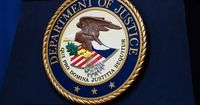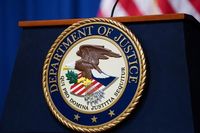The U.S. Department of Justice (DOJ) has come under fire for dispatching armed U.S. marshals to the home of a former pardon attorney, Liz Oyer, ahead of her scheduled testimony before congressional Democrats. The incident, which involved the delivery of a letter warning Oyer against speaking out, has raised serious concerns about intimidation tactics employed against whistleblowers.
On Friday, April 4, 2025, the DOJ planned to send marshals to deliver a letter to Oyer, who was fired by the department on March 7 after refusing to recommend the restoration of gun rights to actor Mel Gibson, a supporter of former President Donald Trump. Oyer's attorney, Michael Bromwich, criticized the DOJ's actions, stating, "This highly unusual step of directing armed law enforcement officers to the home of a former Department of Justice employee who has engaged in no misconduct, let alone criminal conduct, simply to deliver a letter, is both unprecedented and completely inappropriate."
The letter was intended to dissuade Oyer from discussing her allegations of wrongful termination during a forum hosted by Senator Adam Schiff (D-Calif.) and Representative Jamie Raskin (D-Md.) on April 7. It warned Oyer that the DOJ expected her to decline to respond to questions about internal deliberations regarding Gibson's gun rights. Associate Deputy Attorney General Kendra Wharton, who authored the letter, cited significant confidentiality interests and executive privilege as reasons for the warning.
Oyer, who confirmed receipt of the letter electronically, said the DOJ's attempt to intimidate her was clear. "The letter was a warning to me about the risks of testifying here today. But I am here because I will not be bullied into concealing the ongoing corruption and abuse of power at the Department of Justice," she declared during her testimony.
Following the delivery of the letter, the marshals were called off after Oyer acknowledged receipt via email. Bromwich noted that Oyer found the letter in a secondary email account she had not been using for communications with the DOJ's human resources officials. This unusual use of armed marshals to deliver a letter has drawn criticism from legal experts and former officials, with some calling it an overreach of authority.
During her testimony, Oyer recounted her distress upon learning that armed officers were on their way to her home while her teenage child was alone there. "I was in the car with my husband and my parents when I got the news that the officers were on their way to my house where my teenage child was home alone," she explained. Fortunately, a compassionate individual helped facilitate the cancellation of the marshals' visit.
The incident has sparked outrage among Democratic lawmakers. Senator Schiff described the DOJ's actions as an effort to "intimidate and silence" Oyer, while Representative Raskin likened it to tactics "ripped straight from the gangster playbook." Their comments reflect broader concerns about the treatment of whistleblowers and the integrity of the Justice Department.
In her testimony, Oyer emphasized her commitment to speaking the truth despite the DOJ's intimidation tactics. "I will not be bullied into concealing the ongoing corruption and abuse of power at the Department of Justice," she reiterated. This statement underscores the ongoing debate over transparency and accountability within federal agencies.
The DOJ's letter to Oyer asserted that her potential testimony could implicate executive privilege and confidentiality interests related to presidential communications. However, Bromwich countered that the claim was "baseless" and that Oyer was entitled to protections as a whistleblower under federal law. "The argument is completely without merit. The President has not asserted executive privilege over any matter at issue here, nor have you identified specific information potentially subject to such privilege," he wrote in his response to the DOJ.
As the situation unfolds, the scrutiny on the DOJ's handling of whistleblower cases continues to grow. Legal experts are calling for greater protections for individuals who come forward with allegations of misconduct, especially in light of the current political climate. The ramifications of this incident may lead to further discussions about the need for reform within the department.
Oyer's case highlights the challenges faced by whistleblowers in federal agencies, particularly when they expose potential wrongdoing. The use of armed marshals for intimidation raises serious ethical questions about the treatment of former employees who are exercising their rights to speak out.
The DOJ has not yet responded to requests for additional comments on this matter. As the investigation into Oyer's claims continues, the implications of this incident could resonate throughout the department and beyond, potentially affecting how future whistleblower cases are handled.
In the wake of Oyer's testimony, it remains to be seen how the DOJ will address the concerns raised by lawmakers and legal experts. The incident serves as a stark reminder of the delicate balance between protecting sensitive information and upholding the rights of individuals to report misconduct without fear of retribution.
As the nation watches, the outcome of this case may shape the future of whistleblower protections and the integrity of the Justice Department.






